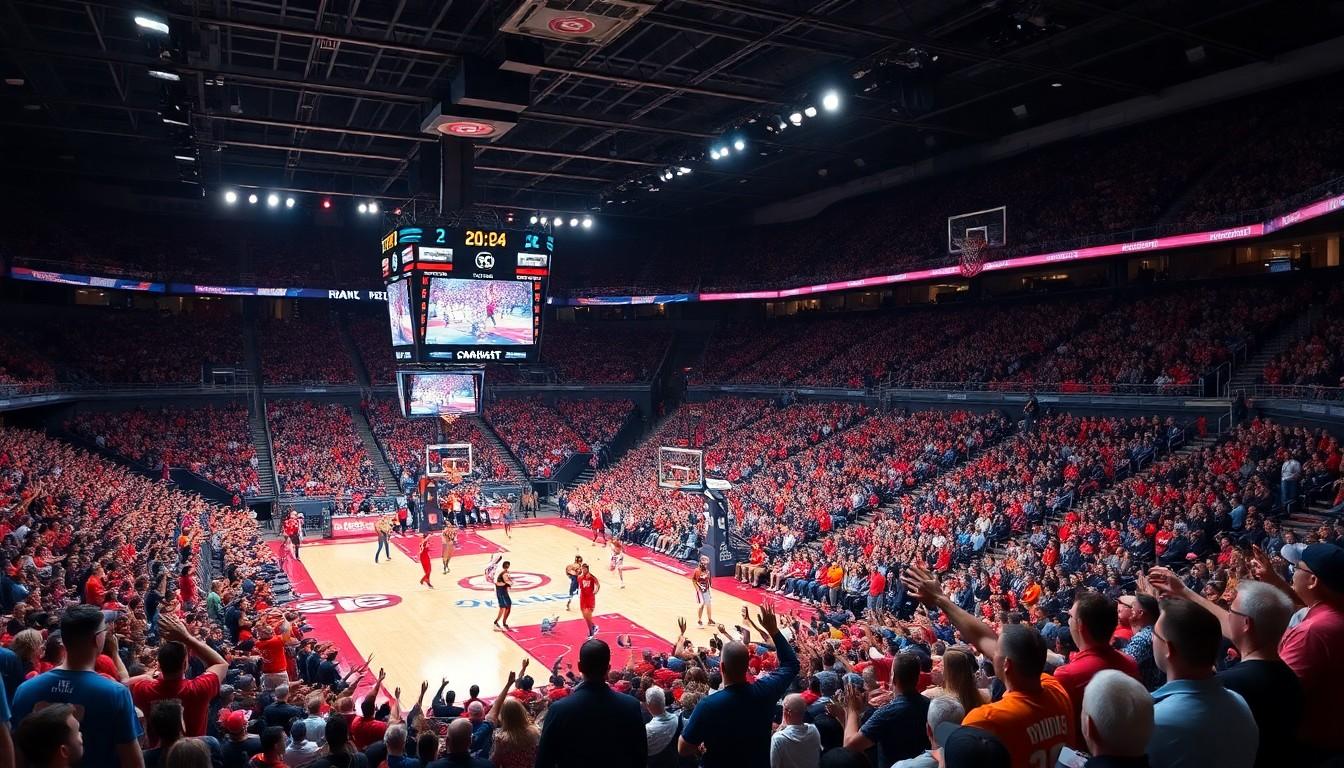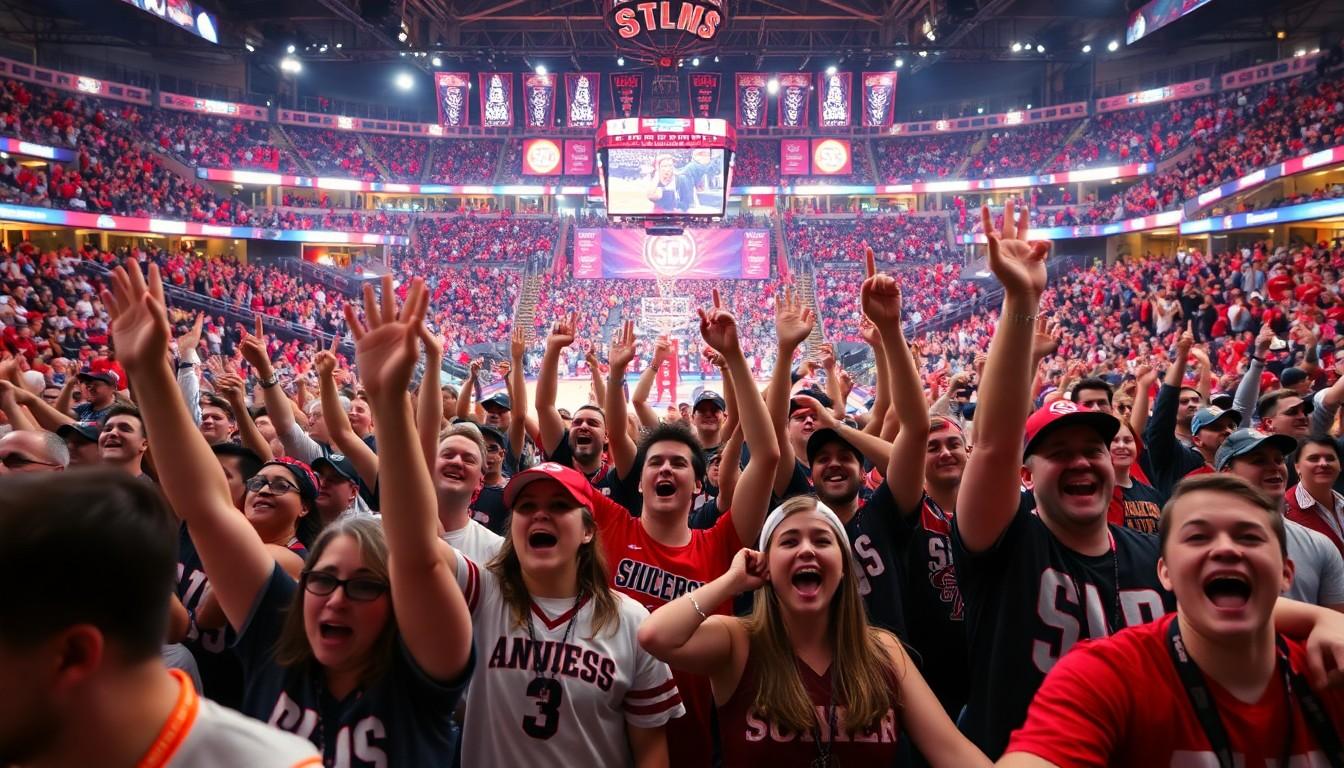As the SEC Tournament approaches, excitement fills the air like a freshly popped bag of popcorn. Fans are gearing up for thrilling matchups that could make or break their team’s season. But before anyone can don their lucky jerseys and settle in with snacks, they need to know one crucial detail: game times.
SEC Tournament Game Times
Game times for the SEC Tournament play a crucial role in fan attendance and engagement. Knowing when each game starts enables fans to plan ahead. The SEC typically schedules matches throughout the day, allowing for flexibility in viewing options.
Evening games often attract larger audiences, while afternoon matchups cater to lunch breaks. Broadcasting networks frequently adjust times based on viewer demand and team rankings. For example, high-profile games often receive prime time slots to maximize exposure.
Fans can expect a set schedule days before the tournament begins, with updates provided as needed. Each matchup generates excitement and is broadcasted across multiple platforms, including cable and streaming services. This accessibility enhances overall fan experience.
Tracking game times includes understanding time zones, especially for fans outside the Eastern Time Zone. Ensuring accurate conversion of times is essential for scheduling viewings. Social media will offer real-time updates, allowing fans to stay informed on potential changes.
Matchups consistently see teams competing for key winning positions, impacting their overall standings. Game times, therefore, directly influence strategies for both fans and players alike. Specific dates and times for preliminary and final rounds will finalize closer to the event date. Overall, SEC Tournament game times are central to the energy and excitement that surround this annual sporting occasion.
Importance of Game Times
Game times significantly influence the dynamics of the SEC Tournament. Scheduling impacts both teams and fans, shaping the experience for everyone involved.
Impact on Teams and Players
Game times directly affect the preparation strategies for teams. Morning matches may challenge players’ routines, while evening games often allow for more recovery time. Coaches adjust training sessions based on these schedules. A well-timed game can boost a team’s performance, particularly in high-stakes situations where peak energy levels matter. Proper timing can create an edge, especially when facing intense competition in the tournament.
Fan Experience and Attendance
Game times greatly enhance the overall fan experience. Fans can plan their attendance around match schedules, ensuring they don’t miss crucial moments. Evening games generally attract larger crowds compared to afternoon matchups. Attendance directly correlates with the excitement of a game; more fans create a lively atmosphere that energizes teams. Viewing options on multiple platforms also accommodate fans unable to attend in person. With real-time updates on social media, fans enjoy a connected experience, keeping them engaged through every shift in the tournament schedule.
Scheduling Factors
Game times for the SEC Tournament depend on various scheduling factors integral to the tournament’s success. These elements directly impact fan experience and team preparation.
Venue Considerations
Location plays a significant role in scheduling. High-capacity venues accommodate larger crowds, allowing for more afternoon games that fit fans’ work schedules. Evening games at popular locations often attract more viewers, resulting in a lively atmosphere. Events at different venues may require flexibility in timing due to logistics. Teams strive for optimal performance by adjusting their routines according to game times.
Television Broadcasts
Television networks influence game schedules based on viewer ratings. Popular matchups, particularly those involving top-ranked teams, receive prime time slots to maximize audience reach. Adjustments are made in accordance with network strategies to enhance visibility and engagement. Flexible scheduling ensures that high-stakes games are accessible to the broadest audience possible. As a result, fans can catch crucial moments live, whether they’re at home or on the go.
Historical Trends in SEC Tournament Game Times
SEC Tournament game times have evolved significantly over the years, adapting to changes in viewer preferences and broadcasting demands. Historical analysis reveals that afternoon games traditionally accommodated fans with daytime commitments, while evening games captured larger audiences seeking prime-time entertainment.
The scheduling patterns exhibited a strong correlation with team performance and viewer ratings. High-stakes matchups, particularly those involving ranked teams, frequently received favored time slots. Review of past tournaments shows that match times often adjusted based on anticipated crowd sizes, indicating that venues capable of hosting larger numbers influenced scheduling decisions.
Data from recent tournaments highlight an increase in the popularity of late afternoon and evening games. These time frames maximize viewer engagement, given that fans can attend after work hours. During previous tournaments, attendance figures spiked for evening sessions, illustrating the importance of time selection.
Coaches and players also adapt their strategies based on these scheduling trends. Morning games contribute to different preparation dynamics compared to evening contests, where teams benefit from extended recovery periods. Analysis of operational adjustments made by various teams further illustrates the impact of game timing on overall performance.
Television networks consistently shape game time availability by prioritizing matchups that attract larger audiences. Historical trends show that networks strategically select game times to enhance visibility. Flexibility in scheduling allows fans to engage with the tournament across multiple platforms.
Understanding these historical trends in SEC Tournament game times informs audience expectations and highlights the crucial role time placement plays in the tournament’s overall success. Real-time updates via social media ensure fans remain engaged, regardless of their attendance.
Future Outlook on SEC Tournament Game Times
Future SEC Tournament game times reflect ongoing adaptations to fan preferences. Evening games tend to attract larger audiences, leading to potential shifts in scheduling for high-profile matchups. Factors influencing these decisions include venue capacity and broadcasting commitments, ensuring exciting games occur when most viewers can tune in. Afternoon games cater to those with daytime obligations, effectively engaging fans during their lunch breaks.
Historical trends illustrate how game times have evolved. Recent seasons show a pronounced preference for late afternoon and evening games, aligning with heightened viewer engagement. Coaches and teams adjust preparations accordingly, as the stakes of evening matchups necessitate different strategies compared to morning contests.
Television networks continue impacting scheduling, prioritizing prime time slots for compelling matchups. Viewer demand shapes these time slots, ensuring high anticipation for pivotal games. Audience feedback further informs scheduling strategies, allowing for real-time adjustments that keep fans engaged, both at home and in the arena.
Expectations surrounding game times will likely solidify as the tournament approaches. Fans can anticipate updates on match schedules days before the event, reinforcing planning for attendance and viewing. Social media provides continuous updates, responding to any changes efficiently and keeping supporters informed.
As the SEC adapts to the landscape of college basketball, game time dynamics remain crucial. Understanding these elements immerses fans in the excitement of the tournament, making each moment significant and unforgettable.
The SEC Tournament promises to be a thrilling event for fans and teams alike. With carefully scheduled game times that cater to viewer preferences and attendance, each matchup holds the potential for unforgettable moments. As the tournament approaches fans should stay tuned for updates on game schedules and times to ensure they don’t miss any critical action. The evolving dynamics of game times not only enhance the fan experience but also influence team strategies, making every game count. Engaging with real-time updates on social media will keep supporters connected and informed, adding to the overall excitement of the tournament.


